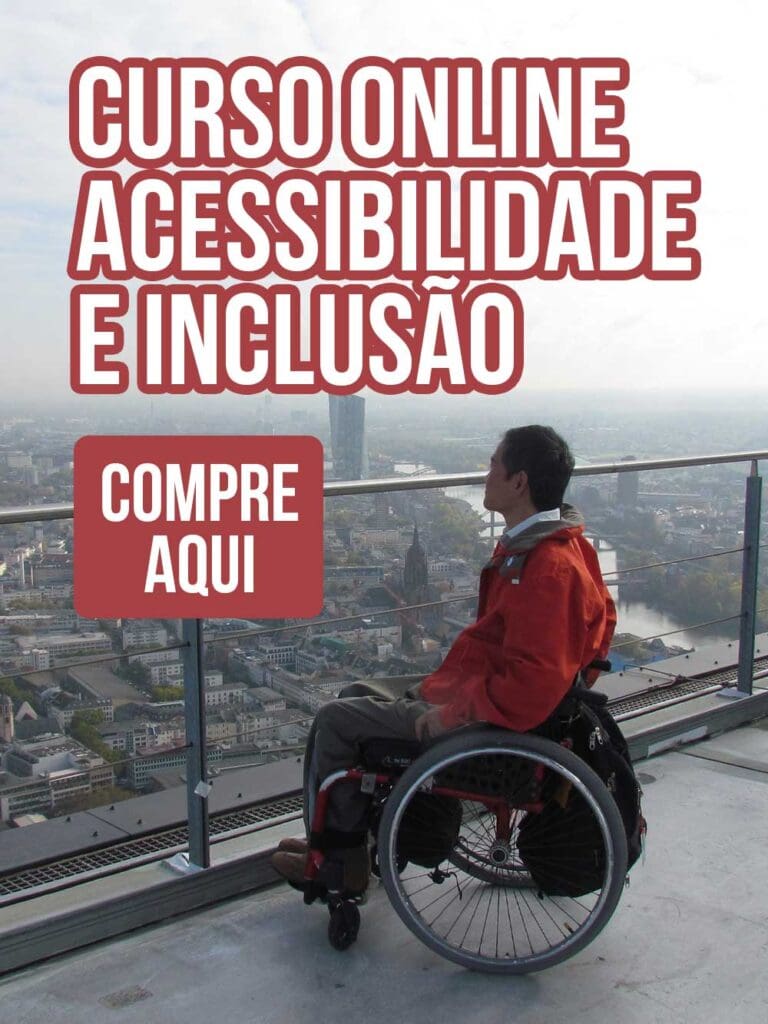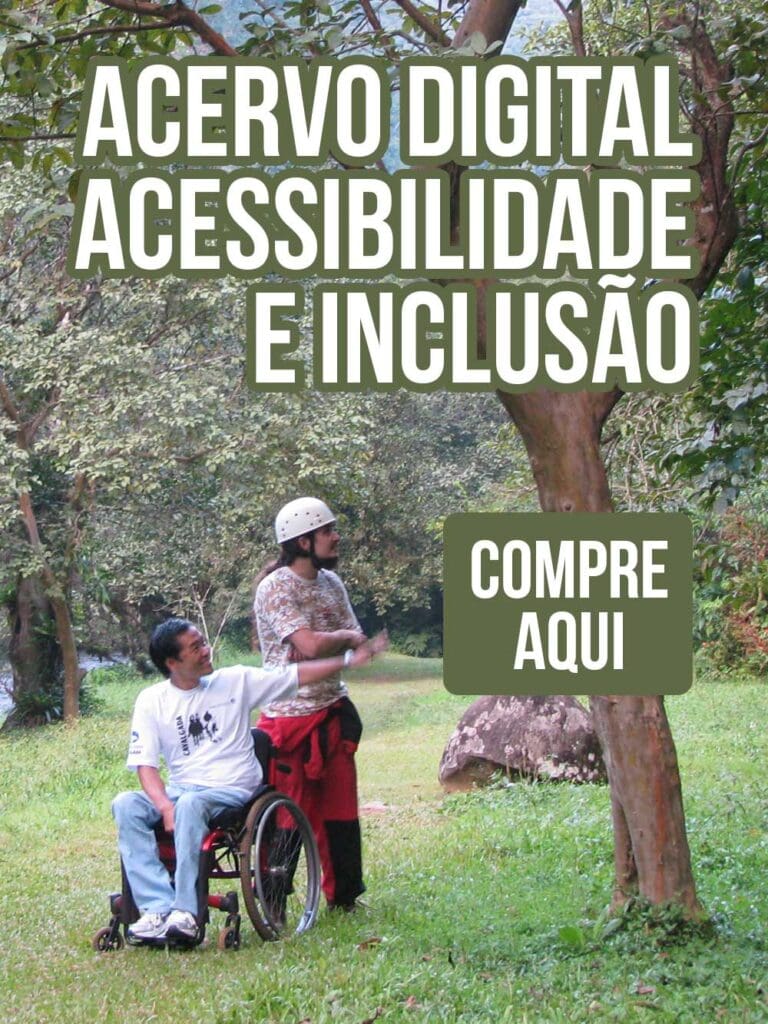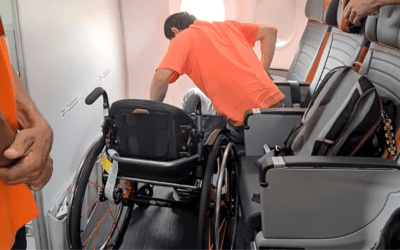
Brazil’s wheelchair tourism guru
Ricardo Shimosakai has been to 25 countries and 200 holiday destinations. But he is sometimes sad to move around in his own home country, Brazil.
Ricardo has been a wheelchair user since 2001, when he was shot after an attempted kidnapping. He is now a tourist agent who specialises in finding holiday packages for people with mobility issues.
He believes all tourists – regardless of any disability they may have – should be able to go anywhere they please, and not just to destinations with good standards of accessibility.
But sometimes that is easier said than done.
“One time flying back from Argentina, I had to sit inside the plane for more than one hour in Sao Paulo. The company did not have anyone to help me get off the plane,” he says.
 Ricardo is determined to improve the tourist experience for people with mobility issues
Ricardo is determined to improve the tourist experience for people with mobility issues
The sad part, he says, is that this was not an isolated incident. It happens repeatedly to virtually all wheelchair users who fly in Brazil.
‘Not seen as consumers’
One of the main differences with the US or European countries is that Brazilian airports do not have a dedicated company to assist passengers in wheelchairs.
That task is left to each airline, some of them with very poorly trained staff. The level of service to passengers in wheelchairs is always left to chance.
“In Brazil, our accessibility conditions are too precarious. People with disabilities are not seen as consumers,” says Ricardo.
 Infrastructure in Europe and the US is generally much more accessible than that in Brazil
Infrastructure in Europe and the US is generally much more accessible than that in Brazil
It is not just airports and planes that are below international standard. The whole infrastructure is poor, even in big cities such as Sao Paulo and Rio de Janeiro.
Ricardo once had a request for a travel package for a group of 22 people from Israel – 10 of whom were wheelchair users.
“There is no transport company in Brazil that can assist 10 people in wheelchairs at the same time. Also no hotels would be able to house all of them together. We would have to split them into three hotels, far away from each other,” says Ricardo.
“I never heard from the Israeli group again.”
If that group had wanted to go to France, on the other hand, Ricardo would have been better placed to assist them. He offers a package for groups of up to 14 people. There they use the same bus, see all sights together and spend the night in the same hotel.
‘Obligation or pity’
Ricardo has made a career out of fighting for change. It is hard for him to offer good holiday packages to his clients – as he does not own the airports, buses and hotels.
 Ricardo offers holiday packages for disabled groups to see the sights of Paris
Ricardo offers holiday packages for disabled groups to see the sights of Paris
But he can reach out to the owners and authorities to demand better infrastructure, and has won awards for his work.
“In Brazil people will only act to help out others with disabilities out of obligation or pity. No-one sees the person with disability as a proper consumer, as they are seen abroad. Other countries earn billions of dollars offering services to this niche. But not here.”
It is estimated that more than 24 million people have some sort of disability in the country, although there is little detail about that number.
Statistics show that people with disabilities are at an economic disadvantage in Brazil – they have higher unemployment rates and a lower level of education.
“Even if you have money, many things are denied to you if you have a disability,” says Andrea Koppe, from Unilehu, a non-governmental organisation that helps people with disabilities.
“Some schools won’t take in children with special needs, saying they lack the preparation and specialisation. Others say parents have to pay extra for special tutors, in the case of visually impaired students.”
Affirmative action
Brazil has been trying to change that with affirmative action. Since 1991, legislation requires companies with more than 100 employees to give at least 2% of their jobs to people with disabilities.
 Accessible route? Ricardo has scaled the heights of Machu Picchu as part of his research
Accessible route? Ricardo has scaled the heights of Machu Picchu as part of his research
Andrea Koppe says that over the course of 20 years, that has helped transform many disabled people who were once ignored by shops and companies into proper consumers. The number of people with disabilities in the labour market rose from 15,000 to 350,000.
Still, she says that if the affirmative action law had been followed fully and properly, that number should be more than a million. Overall there are 11 million people of working age with disabilities – and most of them are unemployed.
Ricardo Shimosakai says there is much work to be done by everyone. He is still trying to convince Brazilian authorities of the importance of changing regulation.
The country is about to privatise some of its airports. The tourist agent would like to see contracts that demand airport administrators hire specialised firms to assist disabled passengers, as happens elsewhere.
But from his own experience, most businesses don’t have the energy to promote change.
The wheelchair he uses was given to him by an airline as compensation. The company had broken his because staff did not have a proper way to transport it.
“I tried talking to them,” he says. “But instead of properly training their staff, they just thought it would be easier to buy me a new one. They don’t want to change things.”
https://youtu.be/PiRoz77HaY0
Source: BBC
Compartilhe
Use os ícones flutuantes na borda lateral esquerda desta página
Siga-nos!
Envolva-se em nosso conteúdo, seus comentários são bem-vindos!
Artigos relacionados
Acessibilidade no transporte aéreo. Atualização das regras.
Acessibilidade no transporte aéreo. Revisão da Resolução nº 280/2013 da ANAC através de consulta e audiência pública.
Inclusão no filme Wicked. Atriz cadeirante chama a atenção.
Inclusão no filme Wicked. Marissa Bode é uma atriz com deficiência na vida real, e sua deficiência não foi um impedimento para a atuação.
Diretrizes da ANPTUR para o Turismo Brasileiro
Diretrizes da ANPTUR para o Turismo Brasileiro. Acessibilidade é um dos capítulos desse importante guia orientador para o turismo.






0 comentários